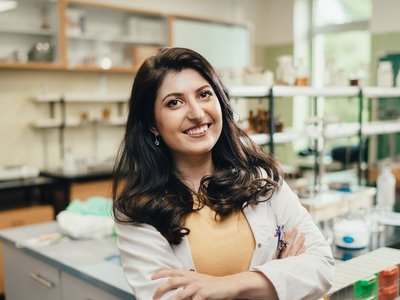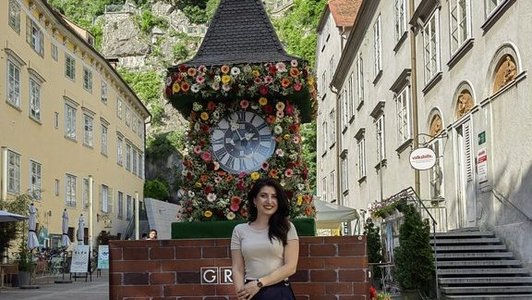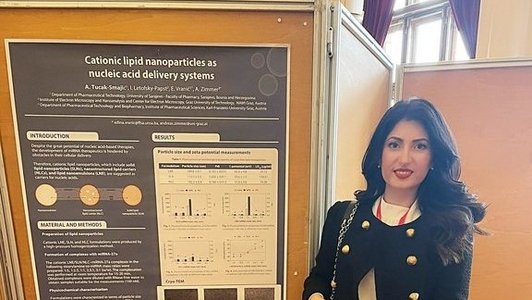

How did everything begin?
Due to limited research opportunities in Bosnia and Herzegovina, particularly due to poor infrastructure, my supervisor, Prof. Dr. Edina Vranić, recognized the potential of utilizing the CEEPUS mobility programme to engage in research at leading European universities. During the final year of my master's studies, I participated in a CEEPUS mobility programme in Graz. There, I had the opportunity to connect with the entire team at the Department of Pharmaceutical Technology & Biopharmacy, led by Prof. Dr. Andreas Zimmer.
Upon gaining insight into their research focus, a collaborative decision was made for me to pursue my PhD research topic, titled "Formulation and Characterization of Cationic Nanostructured Lipid Carriers," at the University of Graz through the CEEPUS mobility programme. This PhD research was mentored by both Prof. Vranić and Prof. Zimmer. Subsequently, we explored the possibility of securing additional funding through the scientific and technological cooperation initiative (S&T cooperation) between Bosnia and Herzegovina and the Republic of Austria for the years 2019 and 2020, which was administered by OeAD.
A few months later, we received the gratifying news that our joint research project, titled "Lipid Nanoparticles as Drug Delivery Systems for MicroRNA," had been successfully accepted for funding. This achievement marked a significant step forward in our collaborative research endeavors between Bosnia and Herzegovina and Austria.
Why are you interested in this research, what do you find so exciting about it, and what do you want to achieve and why?
From 2019 to 2023, I had the extraordinary opportunity to spend approximately 10 months in Austria, where I conducted the entire experimental part of my thesis at the aforementioned department. My research focuses on the formulation and characterization of cationic nanostructured lipid carriers as drug delivery systems for microRNA, particularly miRNA-27a. This work is positioned at the intersection of nanotechnology and therapeutic strategies for treating and preventing obesity. What excites me most about this research is its potential impact on addressing a global health issue—obesity. By leveraging nanotechnology and microRNA, we aim to develop innovative approaches for more effective drug delivery systems. The prospect of contributing to advancements in obesity treatment is both intellectually stimulating and socially significant.
This period in Austria marked my first encounter with cell culture laboratories, providing me with invaluable hands-on experience. I had the privilege of conducting my research on two distinct cell lines, broadening my understanding of cellular processes and experimental methodologies. Moreover, I gained access to state-of-the-art equipment dedicated to the formulation and characterization of lipid nanoparticles. This access not only facilitated the practical aspects of my research but also exposed me to cutting-edge technologies in the field.
Which impact did your scholarship in Austria have on your personal and professional development?
As a result of these investigations, we have recently published a paper titled „Development and Characterization of Cationic Nanostructured Lipid Carriers as Drug Delivery Systems for miRNA-27a“ in Pharmaceuticals and presented our research at several symposiums and congresses. At the congress „BioNanoMed 2023“, which was held in April in Graz, our poster presentation received an award for one of the best poster presentations. This trip was financially supported by the Bosnia & Herzegovina Future Foundation, in the form of the Vera Šnajder Award, named after one of the most famous Bosnian mathematicians.
During my stay in Austria, I not only acquired valuable knowledge in the field of pharmaceutical technology but also forged lifelong friendships. My roommates, hailing from various corners of the world, enriched my cultural understanding. At the department, I collaborated with remarkable young individuals from different parts of Europe. Witnessing their achievements, including receiving positive responses from editors, publishing papers in great journals, and obtaining their Ph.D. titles, was truly inspiring.
As I approach the final phase before my thesis defense, I'm hopeful that my friends from Austria will be able to join and support me during this significant milestone.
What are your plans and hopes for the future?
My foremost aspiration is to continue this research in my homeland, at the University of Sarajevo - Faculty of Pharmacy, by finding the funds and grants to establish a Nanotechnology Lab and acquire the necessary equipment for this type of study.
CV:
Amina Tucak-Smajić is currently working as a Senior Teaching and Research Assistant at the University of Sarajevo - Faculty of Pharmacy, Department of Pharmaceutical Technology. Her work responsibilities primarily include conducting laboratory courses for Industrial Pharmacy I & II. Since 2019, she has been pursuing a Ph.D. at the University of Sarajevo - Faculty of Pharmacy, but the entire experimental part of her thesis she did in Austria at the University of Graz, Institute of Pharmaceutical Sciences, Department of Pharmaceutical Technology & Biopharmacy.


